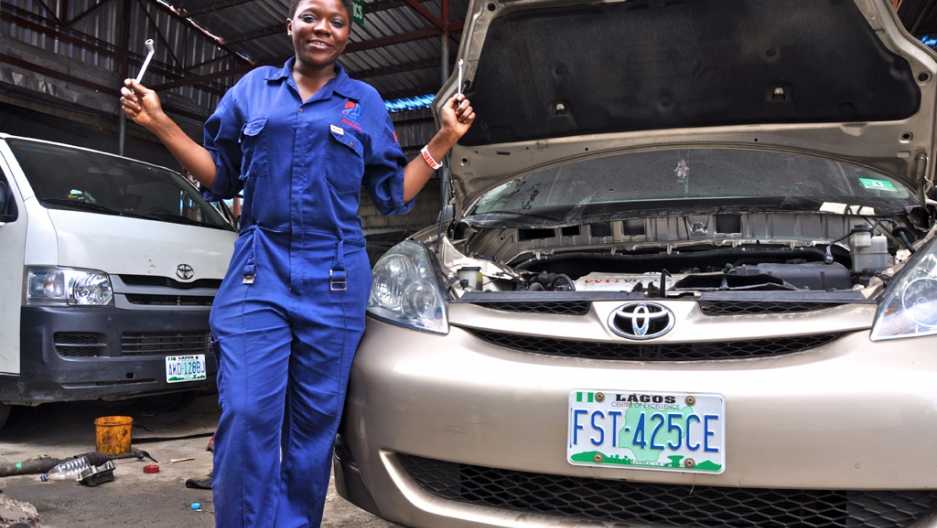Christine Tokpa, 38, a mother of three, has been a housewife since she got married seven years ago.
Now, Christine is breaking gender barriers by training to become a mechanic – a field dominated by males in Liberia.
Dressed in blue overall, flowered rubber boots and a blue cap, the beaming Tokpa says nothing can stop her from making a change in her life.
She’s an apprentice at a local mechanic workshop in Monrovia.
Her decision to become a mechanic came after she suffered many financial challenges as a housewife.
She says her family largely depended on the income of her husband, Matthew Tokpa, 43, who is also a mechanic but has limited training in the profession.

“The daily meager earnings that he make cannot support us all, especially with basic family needs and children’s school fees,” she says.
She is one of 15 women who enrolled at the Monrovia Vocational Training Center, a popular technical vocational school along the Somalia Drive, which aims to empower people to be self-sufficient.
It wasn’t easy convincing her husband that being trained to work as a mechanic could give her a chance to help him with the family’s responsibility.
“He said I should look for a more ‘womanly’ job to do,” she says.
“Hairdressing or being a tailor was some of what he recommended.”
She recalls how difficult it was for her husband’s relatives to accept her career choice and her mother-in-law even told her to choose between her family and a career.
“But I believed in myself, and I was prepared to forge on come what may,” she says.
“But I like to encourage other women to strive for financial independence and urge government and civil society to initiate campaigns to promote employment equality.”
In Liberia and Africa as a whole, certain professions are still classified as masculine or feminine.
Mechanics, technicians, masons, public transportation drivers, and occupations involving science, technology and political leadership, among others, are considered masculine careers.
On the other hand, feminine occupations include nurses, childcare workers, hair stylists, secretaries, administrative assistants and office receptionists.
Despite the upsurge of women’s social movements in the 1970’s and 1980’s aimed at promoting gender equity in all paradigms of life, including occupation, stigmas still surround certain professions.
Naomi Tulay Solanke, Executive Director Community Healthcare Initiative Incorporated, says this is partly because of cultural beliefs that have socially divided gender roles in most African societies, something that might take a long time to erase.
“It is an opportunity to challenge female stereotypes in the society that are aimed at suppressing them,” Solanke says.
“Again, in this era, self-reliance for women is the best option.”
Women in Liberia have been striving to close the gender gap in other fields due to increased exposure to traditionally male professions, education and affirmative action policies.
Thursday, March 8 is year’s International Women’s Day held under the global theme “Press for Progress”.
The National Theme is Act Now: Support the Liberian Women Agenda.
In commemoration of this year’s celebrations, President George Manneh Weah has issued a proclamation declaring the day a working holiday.

